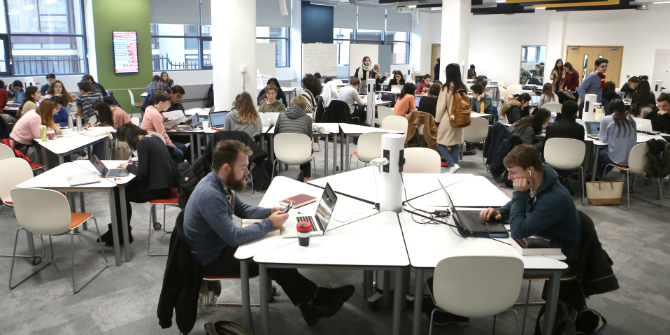
Coming to university, you may sometimes feel like you’re constantly trying to play catch up with the never-ending reading list that worse, only accumulates as the academic weeks pass. Well, fret not because this short guide should hopefully leave you feeling more equipped as you navigate your way through your intense but extremely rewarding knowledge journey in university!
Make it a habit
You’re probably familiar with the concept of spreading out your tasks over a period of time rather than clumping them all together. That’s exactly what you need to do in a situation like this. Personally, I like to set aside a dedicated time slot everyday for reading so it ends up being something I do naturally although if you can’t get it to be the same time everyday, a flexible schedule is absolutely viable too if you know you can still make it work. However, keep in mind that it is important you choose a time that works best for your brain and ability to absorb information.
Prioritise

Studying at university requires a lot of reading within a short timeframe so you have to be selective and accept that you can’t read everything! There will be times when you need to read an entire article or chapter in full and others where you may be looking for specific information relating to an assignment topic so only a couple of pages or paragraphs in a text will be needed.
You may find that the introduction, discussion and conclusion sections are sufficient and that you can just skim through the rest of the text. It may sometimes be worth supplementing them by checking the headings, subheadings, graphs and images and reading the first and last sentence of each paragraph to get an indication of the text’s overarching argument.
Tailor your readings
When reading it is important to remember your purpose. If it’s for a lecture you may only want a broad overview and understanding of the week’s topic by covering the core and recommended readings. Meanwhile for seminars you may want to focus on the extra readings and case studies so you can bring in critical perspectives with the use of relevant real-world examples.
Reading for assignments probably requires a more in-depth analysis on your chosen topic; this is especially important for longer pieces such as your dissertation. Be sure to search for current research on the topic using the LSE’s Library website to keep yourself updated on the latest developments and try using the Library resources guide for a tailored list of sources for a subject.
Look out for overlaps
It is not unusual to have been assigned the same texts to read between several courses and often you’ll be able to find theoretical intersections or even extensions of things you have previously covered. Thankfully, this makes life easier which only makes the case stronger for ensuring you have a decent folder of notes where you can keep track of these key connections.
There are several ways you can organise these thoughts effectively, for instance by creating a Google Docs or a Mind Map. The good thing about these methods is that they are highly collaborative and by harnessing the power of multiple minds you can save even more time and bring in new insights. Moreover, if you can find other forms of the reading or the topic that you’re reading, such as a podcast, a short video or even a book review this may make the original content more easy to comprehend as concepts may be explained in more visual or striking ways that cannot be replicated with plain text.
Get rid of distractions
There’s no use in setting aside time to read only for you to end up spending an hour watching Netflix or scrolling through online shopping sites. If this sounds like you, disable pop-up notifications on your phone, make use of app blocking facilities on your phone and stop playing music with lyrics that cause you to sing along. Instead make a productive space for yourself with good lighting, eat some brain food and reward yourself with short 5 minute breaks periodically.






Useful practical advice